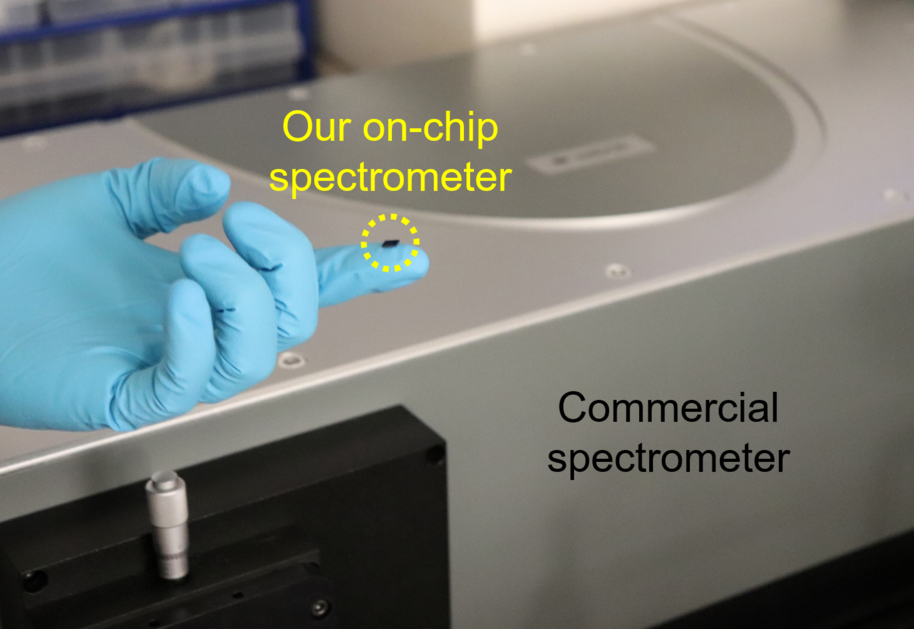From Aalto University [Aalto-yliopisto] (FI)
10.21.22
Postdoctoral Researcher Hoon Hahn Yoon
Aalto University
hoonhahn.yoon@aalto.fi
Professor Zhipei Sun
Aalto University
zhipei.sun@aalto.fi
tel +358 50 4302 820
Professor Pertti Hakonen
Aalto University
pertti.hakonen@aalto.fi
tel +358 50 3442 316
A new chip from Aalto researchers puts photonic information at our fingertips.

A fingertip-sized on-chip spectrometer in the foreground compared to a commercial benchtop-size spectrometer in the background. Photo: Aalto University.
Spectrometers are widely used throughout industry and research to detect and analyse light. Spectrometers measure the spectrum of light – its strength at different wavelengths, like the colours in a rainbow – and are an essential tool for identifying and analysing specimens and materials. Integrated on-chip spectrometers would be of great benefit to a variety of technologies, including quality inspection platforms, security sensors, biomedical analysers, healthcare systems, environmental monitoring tools, and space telescopes.
An international research team led by researchers at Aalto University has developed high-sensitivity spectrometers with high wavelength accuracy, high spectral resolution, and broad operation bandwidth, using only a single microchip-sized detector. The research for this new ultra-miniaturised spectrometer was published today in the journal Science [below].
‘Our single-detector spectrometer is an all-in-one device. We designed this optoelectronic-lab-on-a-chip with artificial intelligence replacing conventional hardware, such as optical and mechanical components. Therefore, our computational spectrometer does not require separate bulky components or array designs to disperse and filter light. It can achieve high-resolution comparable to benchtop systems but in a much smaller package,’ says Postdoctoral Researcher Hoon Hahn Yoon.
‘With our spectrometer, we can measure light intensity at each wavelength beyond the visible spectrum using a device at our fingertips. The device is entirely electrically controllable, so it has enormous potential for scalability and integration. Integrating it directly into portable devices such as smartphones and drones could advance our daily lives. Imagine that the next generation of our smartphone cameras could be fitted with hyperspectral cameras that outperform colour cameras,’ he adds.
Shrinking computational spectrometers is essential for their use in chips and implantable applications. Professor Zhipei Sun, the head of the research team, says, ‘Conventional spectrometers are bulky because they need optical and mechanical components, so their on-chip applications are limited. There is an emerging demand in this field to improve the performance and usability of spectrometers. From this point of view, miniaturized spectrometers are very important for future applications to offer high performance and new functions in all fields of science and industry.’
Professor Pertti Hakonen adds that ‘Finland and Aalto have invested in photonics research in recent years. For example, there has been great support from the Academy of Finland’s Centre of Excellence on quantum technology, Flagship on Photonics Research and Innovation, InstituteQ, and the Otanano Infrastructure. Our new spectrometer is a clear demonstration of the success of these collaborative efforts. I believe that with further improvements in resolution and efficiency, these spectrometers could provide new tools for quantum information processing.’
In addition to Postdoctoral Researcher Hoon Hahn Yoon and Professors Zhipei Sun and Pertti Hakonen, the key Aalto members linked to the work included Postdoctoral Researchers Henry A. Fernandez and Faisal Ahmed, Doctoral Researchers Fedor Nigmatulin, Xiaoqi Cui, Md Gius Uddin, and Professor Harri Lipsanen. Professor Ethan D. Minot, from Oregon State University, joined this work as a visiting scholar at Aalto University for one year. The international research team led by Aalto university also included Professors Weiwei Cai (Shanghai Jiao Tong University), Zongyin Yang (Zhejiang University), Hanxiao Cui (Sichuan University), Kwanpyo Kim (Yonsei University), and Tawfique Hasan (University of Cambridge).
Science paper:
Science
See the full article here.
five-ways-keep-your-child-safe-school-shootings
Please help promote STEM in your local schools.
Aalto University [Aalto-yliopisto] (FI) is a university located in Espoo, Finland. It was established in 2010 as a merger of three major Finnish universities: the Helsinki University of Technology (established 1849), the Helsinki School of Economics (established 1904), and the University of Art and Design Helsinki (established 1871). The close collaboration between the scientific, business and arts communities is intended to foster multi-disciplinary education and research. The Finnish government, in 2010, set out to create a university that fosters innovation, merging the three institutions into one.
The university is composed of six schools with close to 17,500 students and 4,000 staff members, making it Finland’s second largest university. The main campus of Aalto University is located in Otaniemi, Espoo. Aalto University Executive Education operates in the district of Töölö, Helsinki. In addition to the Greater Helsinki area, the university also operates its Bachelor’s Programme in International Business in Mikkeli and the Metsähovi Radio Observatory Metsähovi Radio Observatory [Metsähovin radiotutkimusasema] Aalto University [Aalto-yliopisto](FI) in Kirkkonummi. in Kirkkonummi.
Aalto University’s operations showcase Finland’s experiment in higher education. The Aalto Design Factory, Aalto Ventures Program and Aalto Entrepreneurship Society (Aaltoes), among others, drive the university’s mission for a radical shift towards multidisciplinary learning and have contributed substantially to the emergence of Helsinki as a hotbed for startups. Aaltoes is Europe’s largest and most active student run entrepreneurship community that has founded major concepts such as the Startup Sauna accelerator program and the Slush startup event.
The university is named in honour of Alvar Aalto, a prominent Finnish architect, designer and alumnus of the former Helsinki University of Technology, who was also instrumental in designing a large part of the university’s main campus in Otaniemi.


